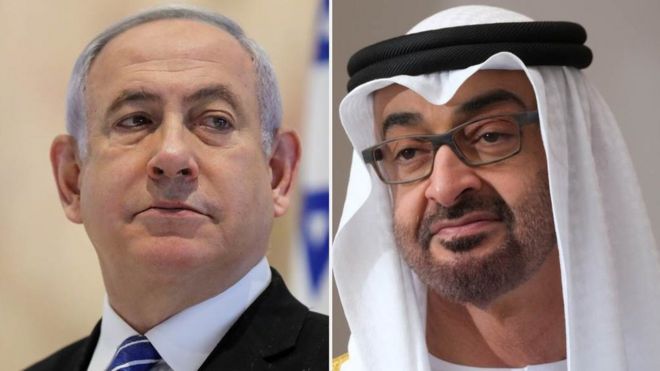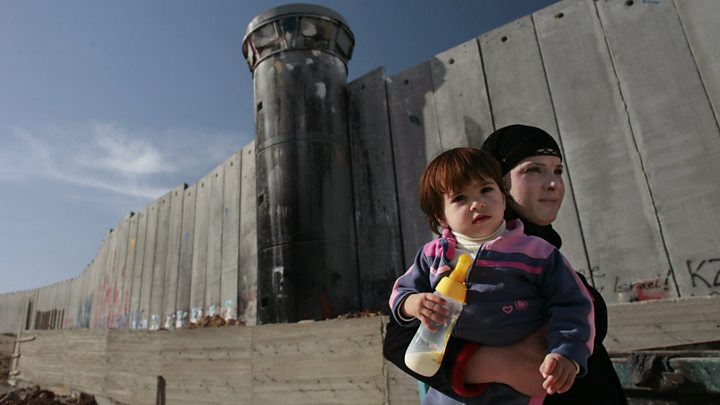
Israel and the United Arab Emirates have reached a deal to normalise relations, with Israel agreeing to suspend its controversial plans to annex parts of the occupied West Bank.
In a surprise statement by US President Donald Trump, who helped broker it, the countries called the accord "historic" and a breakthrough toward peace.
Until now Israel has had no diplomatic relations with Gulf Arab countries.
But shared worries over Iran have led to unofficial contacts between them.
Palestinian leaders were reportedly taken by surprise. A spokesman for President Mahmoud Abbas said the deal amounted to "treason", and the Palestinian ambassador to the UAE was being recalled.
President Trump called the deal between Prime Minister Netanyahu and Abu Dhabi Crown Prince Mohammed bin Zayed Al Nahyan "a truly historic moment". It marks only the third Israel-Arab peace deal since Israel's declaration of independence in 1948, after Egypt and Jordan.
"Now that the ice has been broken I expect more Arab and Muslim countries will follow the United Arab Emirates," he told reporters in the Oval Office, saying there would be a signing ceremony at the White House in the coming weeks.
Earlier, in response to a President Trump's tweeted announcement, Mr Netanyahu wrote in Hebrew: "Historic day."
A foreign policy victory?
In a TV address Mr Netanyahu said he had "delayed" West Bank annexation plans, but those plans remain "on the table". Annexation would make some West Bank areas officially part of Israel.
"There is no change in my plan to apply our sovereignty to Judea and Samaria [West Bank] in full co-ordination with the US. I'm committed to it. That hasn't changed. I remind you that I was the one who put the issue of sovereignty over Judea and Samaria on the table. This issue remains on the table," he said.
Mr Netanyahu said Israel would co-operate with the UAE in developing a coronavirus vaccine, in energy, water, environmental protection and many other fields.
Analysts say the deal could mean a foreign policy victory for President Trump, who will seek re-election in November, and give a personal boost to Prime Minister Netanyahu, who is on trial for alleged corruption.
Both leaders have seen their approval ratings drop because of their response to the coronavirus pandemic. And in Israel, some on the right who want to annex the West Bank expressed anger over the announcement.

The UAE's ambassador to the US, Yousef Al Otaiba, said the deal with Israel was "a win for diplomacy and for the region", adding: "It is a significant advance in Arab-Israeli relations that lowers tensions and creates new energy for positive change".
Senior Trump adviser Jared Kushner said he did not think Israel would move ahead with any annexation before discussing it first with the US. He said he expected to see interactions "very quickly" between Israel and the UAE.
Egypt signed a deal with Israel in 1979, and Jordan in 1994. Mauritania also established diplomatic ties with Israel in 1999, but froze the deal in 2009.

A significant step - but questions remain

The establishment of full diplomatic relations; the exchange of embassies; and normal trade ties between Israel and the UAE is a significant diplomatic step forward. But inevitably it raises questions. Will the full promise of this agreement be realised? And might other Gulf countries follow a similar path?
It is also important to see what it is not. This is far from the comprehensive peace plan to resolve the Palestinian question that President Trump has long promoted. However, there are short-term benefits for all sides.
The White House was first off the mark in announcing the deal; it is perhaps a small diplomatic feather in President Trump's cap at a time when his re-election prospects are looking more difficult.
For Israel's embattled Prime Minister Netanyahu, it gets him off a hook of his own making; his much-vaunted promise to annex key parts of the occupied West Bank. This has proved undeliverable, not least due to US ambivalence and significant international opposition. Mr Netanyahu may see this "peace initiative" with the UAE as something that could bolster his chances if he precipitates a further Israeli general election.
For the UAE, it is harder to say precisely what the immediate benefits are, though its relations with Washington will be strengthened and the deal with Israel may yield significant economic, security and scientific benefits.
Overall this is an agreement that potentially could offer both more and less than might first appear. And as far as the Palestinians are concerned, it is hard to see this news creating anything other than frustration, that they have once again been pushed to the sidelines.

What has been agreed?
In the coming weeks delegations from Israel and the UAE will meet to sign bilateral deals regarding investment, tourism, direct flights, security, telecommunications, technology, energy, healthcare, culture, the environment, the establishment of reciprocal embassies, and other areas of mutual benefit.
"Opening direct ties between two of the Middle East's most dynamic societies and advanced economies will transform the region by spurring economic growth, enhancing technological innovation, and forging closer people-to-people relations," the joint statement says.
Israel will also "suspend declaring sovereignty over areas outlined" in President Trump's Vision for Peace between Israel and the Palestinians, in which he backed an Israeli plan to annex Jewish settlements in the West Bank and the strategic Jordan Valley.
The Palestinians have warned that such a move would destroy their hopes of a viable future independent state and violate international law - a stance supported by much of the international community.
The UAE Minister of State for Foreign Affairs, Anwar Gargash, said the UAE's recognition of Israel was "a very bold step" to stop the "ticking time bomb" of Israel's annexation of the West Bank. He said the UAE saw this as "a stoppage of the annexation, not a suspension".
Asked about Palestinian criticism of the UAE move, he recognised that the region was very polarised and he expected to hear "the usual noise". "We agonised over this," he said, but eventually decided "let's do it".
The joint statement says Israel will "focus its efforts now on expanding ties with other countries in the Arab and Muslim world", and that the US and UAE will work to achieve that goal.
The UAE and Israel will also join the US to launch a "Strategic Agenda for the Middle East", with the three leaders noting that they "share a similar outlook regarding the threats and opportunities in the region, as well as a shared commitment to promoting stability through diplomatic engagement, increased economic integration, and closer security co-ordination".
How have others reacted?
UK Prime Minister Boris Johnson said "it was my profound hope that annexation did not go ahead in the West Bank and today's agreement to suspend those plans is a welcome step on the road to a more peaceful Middle East".
Egyptian President Abdul Fattah al-Sisi welcomed the deal while Jordan's Foreign Minister Ayman Safadi said the agreement could help push ahead stalled peace negotiations.
But a senior Palestinian official, Hanan Ashrawi, condemned the deal, saying the UAE had "come out in the open on its secret dealings/normalisation with Israel" and telling Prince Mohammed: "May you never be sold out by your 'friends'."
Iran's foreign ministry called the accord "shameful", according to state news agency IRNA. And in Gaza, the Hamas militant group called the deal a "stabbing in the back of our people."
Comments
Post a Comment